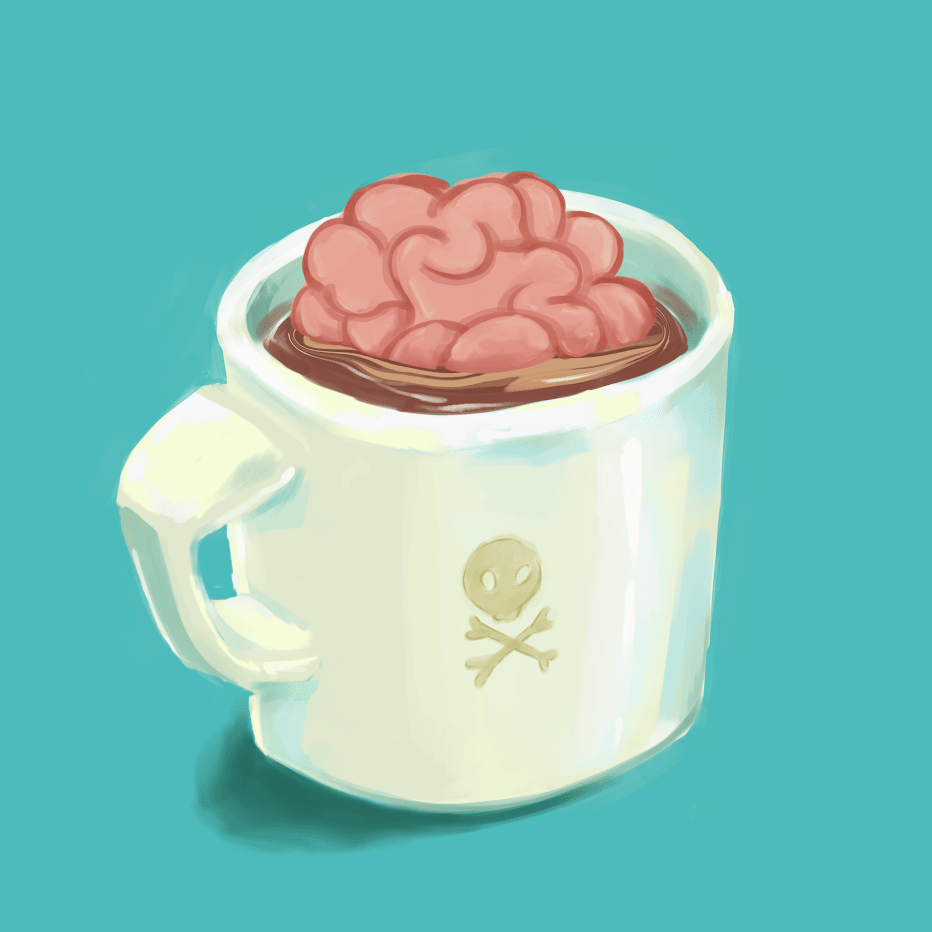Yawns of the Youth: A Wakeup Call to the Risks of Caffeine
Though caffeine may be the key to keeping you awake in class or at all hours of the night, constant high caffeine consumption has many negative effects.
Reading Time: 4 minutes

Ring, ring! You wake up to a blaring alarm, tired and eager to fall back asleep. Your morning routine is a blur, and the next thing you know, your train reaches Chambers Street. You swerve through the crowd of your peers forming around the subway station and get on line by the breakfast truck to grab your morning coffee. For many Stuyvesant students, caffeine seems like the only reliable source of energy after a long week of sleep deprivation. However, does caffeine consumption have unintended consequences?
According to the National Health and Nutrition Examination Survey, around 80 percent of the American population consumes caffeine on a daily basis, and those between the ages of 14 and 22 consume an average of 106.95 mg of caffeine per day, which is a little more than one cup of coffee. Experts recommend that teens get no more than 100 mg of caffeine a day, though even smaller amounts can still result in unhealthy dependencies. Caffeine can be found in a vast range of foods and beverages, from soda to chocolate to tea. Though many are first exposed to caffeine through soda, coffee is the largest contributor to caffeine intake for American teenagers.
Caffeine is a part of the xanthine chemical group, a group of basic alkaloids. Molecules of the xanthine group tend to act against adenosine and increase alertness in the central nervous system. Usually, adenosine builds up throughout the day, eventually binding to receptors and signaling to the brain to begin preparing for sleep. The two-ring molecular structure of caffeine is nearly identical to that of adenosine, allowing it to bind to the same receptors after ingestion, blocking central nervous system activity and forcing the brain to become more active. Essentially, caffeine fools adenosine receptors into increasing nervous system activity, signaling the adrenal glands to produce more adrenaline, or epinephrine, and increase dopamine signaling. Thus, caffeine intake increases heart rate, constricts blood vessels, and improves muscle contraction.
In moderate doses, around 100 mg per day for teens, caffeine improves alertness, focus, and cognitive performance—qualities that make it ideal for the occasional all-nighter. Caffeine has also proven beneficial for athletic performance, as it decreases reaction time and sustains endurance. However, since the body metabolizes caffeine at a constant rate, consuming small amounts of caffeine corresponds to a shorter window of effectiveness.
The feedback loop with caffeine involves several key components, all connecting back to the idea that caffeine stimulates the production of dopamine, which is associated with feelings of pleasure and reward. This also increases feelings of energy, alertness, and focus, which bring positive feedback, as they contribute to feelings of motivation and productivity. However, over time, the body may become accustomed to the effects of caffeine, and the neurotransmitter response may start to diminish. This can lead to negative feedback brought by caffeine withdrawal symptoms, such as headaches and fatigue, when the actual caffeine intake doesn’t satisfy the expectations of the body. This negative feedback can lead to a cycle of caffeine dependence, where one needs to consume more and more to achieve the same effect. Caffeine triggers the brain to produce more adenosine receptors in an attempt to maintain balance amidst constant consumption. This increases the likelihood that adenosine binds to its receptors, bringing drowsiness and lack of focus; the same amount of caffeine becomes ineffective in the face of increasing receptors.
Since caffeine blocks receptors that guide the body to sleep, caffeine can also result in insomnia. By delaying the body’s internal clock, caffeine reduces the amount of sleep one gets. In fact, a clinical trial carried out by Professor of Psychiatry and Pharmacology at Boston University Dr. Gary Kaplan found that consuming caffeine six hours before bedtime can reduce sleep time by an hour. Lack of sleep increases anxiety levels and mood disorders, and can even lead to symptoms of major depressive disorder. As caffeine is a central nervous system stimulant, regular use brings dependence. If one stops consuming caffeine for more than two days, they may face withdrawal symptoms like constant sleepiness, low energy, and headaches.
Though moderate caffeine consumption is generally considered safe for most people, it tends to be challenging to maintain regular intake at healthy levels. With excessive consumption, the negative effects of caffeine can become much more pronounced. Fortunately, there are alternative ways to boost energy without caffeine. For instance, lemon water and ginger can help improve digestion and reduce inflammation and headaches, boosting overall energy levels. Staying hydrated by drinking plenty of water can also help improve energy levels by reducing fatigue from dehydration. Frequent small snacks throughout the day can help maintain energy levels and prevent dips in blood sugar that can cause fatigue. Apples are a great alternative for a quick energy boost, as they contain natural sugars and fibers, providing a long-lasting source of energy.
Ultimately, for those who crave their morning coffee fix, it is important to maintain moderate, healthy caffeine intake levels to balance its risks and benefits, and to consider alternative ways to boost energy without solely relying on caffeine. Of course, there is always the option of getting more sleep, but knowing Stuyvesant students, that is highly unlikely.
